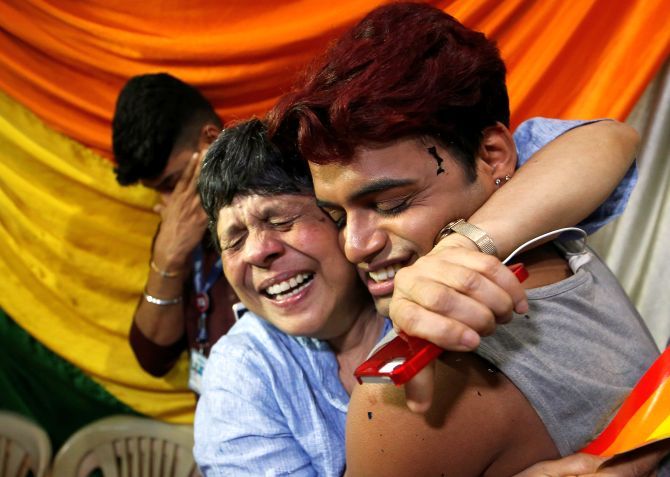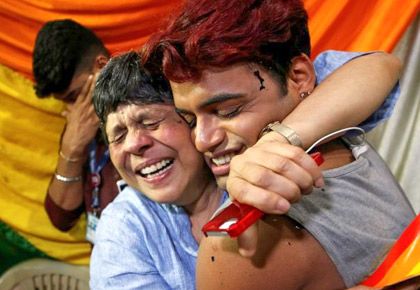'It is time to stand up for our sisters and brothers and friends and their families.'
'It is time to share the burden and remind them, like the highest court in the land just did, that they are not alone and that you wouldn't stand for their persecution,' says Ankit Deshpande.

*Photograph: Francis Mascarenhas/Reuters
I always imagined The Verdict would make me feel better -- like an on-off switch.
Of course, it didn't.
Some wounds take time.
But now isn't the time to mourn; it's a time to remember, solemnly, of those who have passed on.
And it's a day to celebrate.
In a landmark judgement, the Supreme Court of India decriminalised Section 377 of the Indian Penal Code and, as a result, made gay sex legal in the country.
Between the 2008 Delhi high court ruling and the 2013 and 2018 Supreme Court orders, it has been a rollercoaster ride.
For some of us, justice came tad late.
My brother, who struggled with his coming out for several years, eventually gave up.
Some years ago, he ended his life with a noose made from dupattas and saris. That's all it took.
I carried him to the pyre the next morning, but the weight of his mortal remains has never really lifted.
In the 230-page verdict of the landmark judgment, Justice Indu Malhotra made what I thought was perhaps the bravest statement.
'History owes an apology to the members of this community and their families, for the delay in providing redressal for the ignominy and ostracism that they have suffered through the centuries,' the judge said.
To me, it was also the most moving part of the judgment that features quotes from Shakespeare, Goethe and the late Justice Leila Seth.
It was raw and honest.
We do owe the members of the LGBTQI+ community an apology.
For writing them off into the shadows.
For labelling them as criminals.
For trying to change who they are.
The verdict -- and I urge you to read it -- is poetry.
It is also a reminder that no matter how much we complain about our legal system, the judiciary almost always comes through.
You know who did great this month? The Supreme Court.
It had the humility and integrity to accept that a ruling made merely five years ago had to be changed.
Not because someone said it should, but because it was the right thing to do.
In one sweeping statement, the Supreme Court told a small minority that they were not alone.
That they would not be persecuted anymore.
That no one could ask them to change who they were.
You know who didn't -- everybody else.
While the overburdened court went about doing its job quietly, a bridge collapsed, a MiG crashed and an MLA encouraged boys to kidnap girls.
And I haven't even gone beyond the first page of the week's newspapers.
There is a phrase on page five of the judgment (jump to page 267 if you are reading it as a PDF on your screen) that aptly describes the journey of the LGBTQI+ community: 'From denial to freedom'.
It has been a long one, yes, but it's done.
Now another journey begins, one that also involves us -- men, specifically straight men, who have enjoyed the privilege of defining the mainstream.
It is time we pull up our socks and stand up for our sisters and brothers and friends and their families.
It is time to share the burden and remind them, like the highest court in the land just did, that they are not alone and that you wouldn't stand for their persecution.
Perhaps you'd forgive me if I turn from my own feelings to the words of the late Justice Leila Seth:
'What makes life meaningful is love. The right that makes us human is the right to love. To criminalise the expression of that right is profoundly cruel and inhumane. To acquiesce in such criminalisation or, worse, to recriminalise it, is to display the very opposite of compassion.'
It is time.











